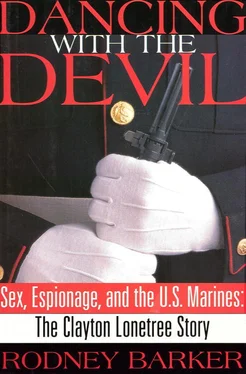“Are you willing to meet with them?” Little John asked.
“Sure,” Lonetree replied, unaware that the people he was about to be introduced to were special agents from the Naval Investigative Service, whose interest in him was less damage assessment than criminal prosecution.
At this time the NIS headquarters filled the top floor of a gray, three-story building of World War II vintage in a government complex that did nothing to improve the low-income neighborhood of Suitland, Maryland. Long, dim, poorly ventilated corridors that smelled of asbestos led to depressingly small offices divided into cluttered cubicles, and the atmosphere reflected the morale at NIS, which was at an all-time low.
Throughout the eighties the United States had been rocked by one major spy scandal after another. After plundering Navy secrets for eighteen years, the Walker family spy ring was exposed. Jonathan Jay Pollard was caught turning boxloads of top-secret material over to Israel. Ronald Pelton was identified as an inside source of information to the KGB on the National Security Agency’s multibillion-dollar electronic eavesdropping program. Edward Lee Howard, trained by the CIA to be a spy in the Soviet Union, defected to the Soviet Union. And these were just a few of the high-profile cases that explain why, in the intelligence community, the eighties would be referred to as “The Decade of the Spy.”
Because key elements of America’s national security strategy involved maritime power, it stood to reason that U.S. Navy personnel would be prime targets of hostile intelligence services, and that conclusion had brought increased pressure on the Naval Investigative Service (NIS), the senior criminal/counterintelligence investigative agency for the Department of the Navy, to initiate programs that would ferret out other spies among Navy and Marine Corps personnel. The pressure to aggressively pursue traitors in their midst, added to the usual business of conducting criminal investigations into murder, robbery, arson, and fraud, had magnified the workload such that it was wearily joked about among agents that there was no life after NIS. One agent, driving home after a sixteen-hour workday, had been stopped for driving while intoxicated when he was simply exhausted.
The strain was also taking its toll on Lanny McCullah, director of the Counterintelligence Directorate, the most prestigious position in NIS. A dapper-dressing pipe smoker in his late forties, McCullah was a first-class foreign counterintelligence (FCI) man, a crisp thinker and quick decision maker who was known for developing concepts that were marketable to the Soviets and successfully running double agents against Soviet military intelligence trying to spy on Navy operations. After twenty-five years with the Naval Investigative Service, he was the man responsible for all investigations, operations, and the collection of counterintelligence information for the NIS.
The sequence of events that would alert McCullah to the Lonetree situation began with a phone call on the open line from someone on the counterintelligence staff at the Department of State’s Bureau of Diplomatic Security at eleven o’clock in the morning on December 22. Responsibility for security of U.S. diplomatic missions throughout the world rested with the Diplomatic Security Service. When serious espionage cases came up, they were referred to the FBI if the subject of the investigation was a civilian American citizen, but if a member of the armed forces was suspected, the appropriate military investigative agency was contacted. McCullah was asked if he would mind dropping by. Jim Lannon, head of the Counterintelligence Bureau, wanted to have a few words with him.
McCullah glanced at his watch. The annual NIS Christmas luncheon at the Officers Club was scheduled to start in about an hour. “Can it wait until tomorrow?” he asked.
“Let me check,” the man at State replied. “I’ll call back on your secure line.”
As he hung up, McCullah had a feeling that the purpose of the call was other than had been stated. Within minutes he received a call back on the secure line with an explanation.
“What’s the deal?” he asked.
That’s when he first heard the news that a Marine security guard might have passed secrets to the Soviets. He was told a more detailed briefing awaited him at the headquarters of the Central Intelligence Agency. Jim Lannon had just left and would meet him there.
After instructing his key people to lay off the liquor at lunch and stand by the secure phones in case he needed to talk to them, McCullah drove to Langley, Virginia. There, a deputy director in counterintelligence at the Agency briefed both him and Lannon on what had happened.
McCullah wasn’t all that surprised by what he heard. Putting himself on the Soviet side, he’d have gone after Marine guards. Not only were they young, frequently immature, and susceptible to a variety of temptations, they had strategic importance. As he likened it in his mind, if you want to rob a bank and you recruit a teller, all you get is what’s in the cash drawer. If you want access to the vault, you compromise the night watchman.
Next they were shown the message traffic between Langley and Vienna that had started with Lonetree’s approach to the CIA station chief eight days earlier. McCullah was a speed reader, and he digested the contents of the cables quickly. Most of what he read dealt with the debate over whether or not to turn Lonetree around and run him back at the Soviets. Having considered using Marine security guards himself as double agents, McCullah thought it was a bad idea. Given an MSG’s access, if the Soviets started tasking him to do things and he did what they asked, in a relatively short time he could do a lot of damage. And if he didn’t, it would get back to them quickly that he wasn’t doing what they asked. Either way, it would be hard to keep up an operation like that.
But basing its judgment on what was contained in the message traffic, the CIA had rejected Lonetree as a possible DA for other reasons. The advantages they thought would be gained by sending him back with disinformation to discredit everything he had given up to this point, or to introduce a flow of information whose path they could follow, were offset by their assessment of his reliability. Included in the cables were character and personality analyses based on their agents’ contact with Lonetree, which had led them to conclude he was unstable and untrustworthy.
So why had they held on to him for eight days? McCullah wondered with annoyance. It shouldn’t have taken them that long to make that determination.
He knew what their answer would be without bothering to ask. They would say it took them that long to do an internal damage assessment based on his debriefing. Had Lonetree identified any of their people? What did that mean? Who had to be transferred?
While some of this was valid, McCullah’s irritation had to do with the Agency’s history of complicating investigations with its obsession for keeping its business to itself. In the case of Edward Lee Howard, the notorious CIA turncoat, this practice had contributed to the loss of a suspect because the Agency had not shared information with the proper investigative and enforcement agencies in a timely fashion. Here they had been dealing with an espionage suspect for over a week before letting the organization with investigatory responsibilities know about it.
His voice rising, McCullah said, “Damn it, I thought you guys were going to try to do a better job of cooperating. This sounds like the same old crap.”
McCullah’s concern was that in its single-minded interest in damage assessment and by stringing Lonetree along, the Agency might have taken the case down a path that would make his own job more difficult. If the CIA had had Lonetree in custody for over a week and had not properly informed him of his rights, for example, that could have serious legal implications. It might mean that whatever information he disclosed would not be admissible in a court of law, which certainly complicated an investigation aimed toward criminal prosecution.
Читать дальше












